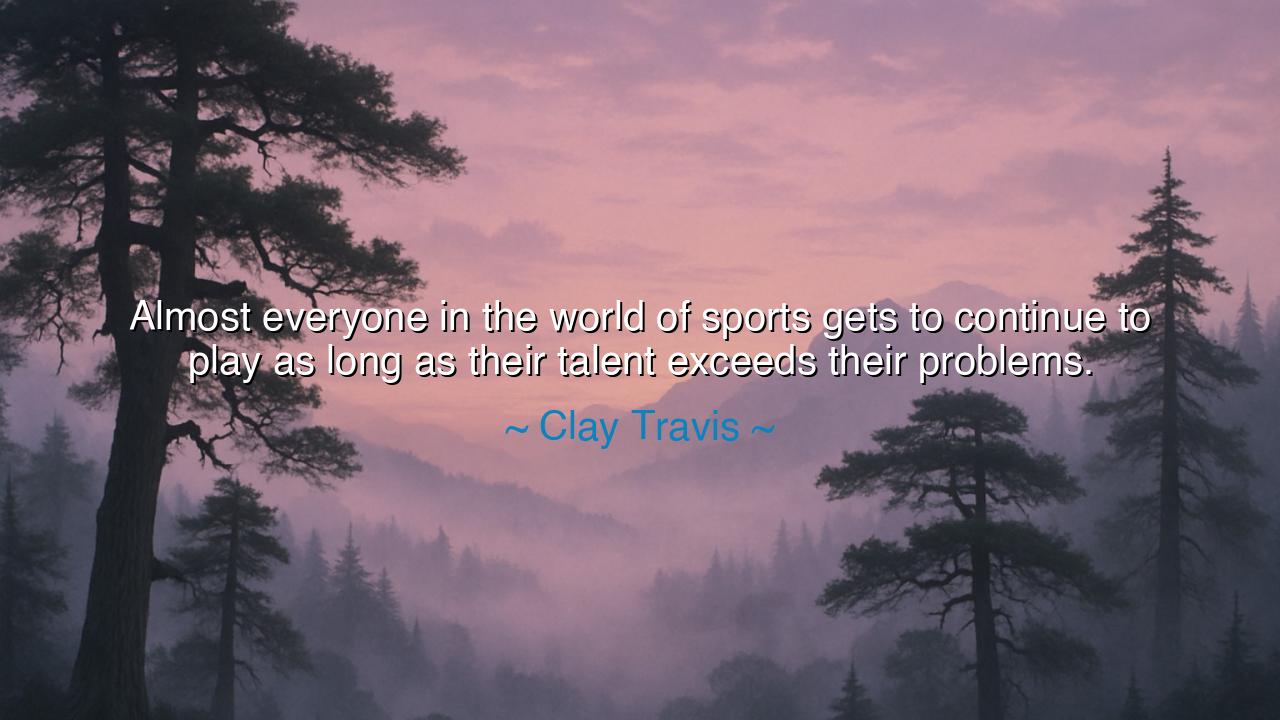
Almost everyone in the world of sports gets to continue to play
Almost everyone in the world of sports gets to continue to play as long as their talent exceeds their problems.






Clay Travis once declared with striking clarity: “Almost everyone in the world of sports gets to continue to play as long as their talent exceeds their problems.” These words, though rooted in the modern arenas of competition, are not merely about athletics. They are a reflection on human nature, on society’s judgment, and on the eternal balance between gift and flaw. For as long as history remembers, greatness has always been weighed upon the scale of virtue and vice, and the world has often chosen to forgive the faults of the gifted if their brilliance still shines brightly enough.
At the heart of this quote lies the reality of talent. Talent is the fire that makes the athlete, the artist, the leader indispensable. In the world of sports, a player with rare skill can bring victory, glory, and wealth to his team and his followers. And so long as that fire burns, society tolerates the smoke of personal flaws. The lesson is both pragmatic and sobering: excellence has the power to shield a man from the consequences of his weakness — but only for a time.
History gives us many examples of this truth. Consider Babe Ruth, whose larger-than-life presence both on and off the field included indulgences and excesses. Yet his bat, his charisma, and his unmatched ability to command the game made the world forgive what would have destroyed a lesser man. Or think of Diego Maradona, whose brilliance on the soccer field was nearly divine, even as his personal struggles were known to all. They continued to play, to lead, to inspire, because their talent outshone their problems — for a while.
But Travis’s words also carry a hidden warning: when the balance tips, when the problems grow greater than the talent, the world’s tolerance fades. History shows this as well. Athletes who once soared are quickly abandoned when their gift wanes or their flaws consume them. For society admires the exceptional, but it is not endlessly patient. Thus the wise man learns that talent is not eternal, and indulgence has its limits. To rely on talent alone is to build upon sand, for even the brightest star eventually burns out.
In this, the teaching is not limited to sports. It applies to every arena of life — politics, business, art, and leadership. A leader may be forgiven his temper if his vision leads a nation; an artist may be forgiven her eccentricities if her work moves the soul. But the moment the gift fades, the moment the flaws outweigh the brilliance, the world will turn its gaze elsewhere. Talent opens doors, but only character keeps them open.
The lesson, children of tomorrow, is this: do not rely only on your talent to protect you from your weaknesses. Strive always to master both. For while the world may overlook your faults if your gifts are dazzling, true greatness lies in building a life where strength of character equals the height of skill. If you polish only your gift and not your soul, the day will come when your problems weigh heavier than your triumphs.
Practical action flows: cultivate your skills with devotion, for talent is a gift that must be honed. But equally, guard your conduct, discipline your desires, and strengthen your character. Do not test how much the world will forgive; instead, build a life where there is little to forgive. In this way, your victories will endure, and your legacy will not crumble when your powers wane.
Thus Clay Travis’s words endure as a mirror, showing both the reality of how the world treats its champions and the warning of what awaits those who neglect their inner life. Remember this: as long as your talent exceeds your problems, the world may keep you in its embrace. But to live truly well, let your wisdom exceed them too, and then no stage, no crown, and no life will ever be lost to you.






AAdministratorAdministrator
Welcome, honored guests. Please leave a comment, we will respond soon